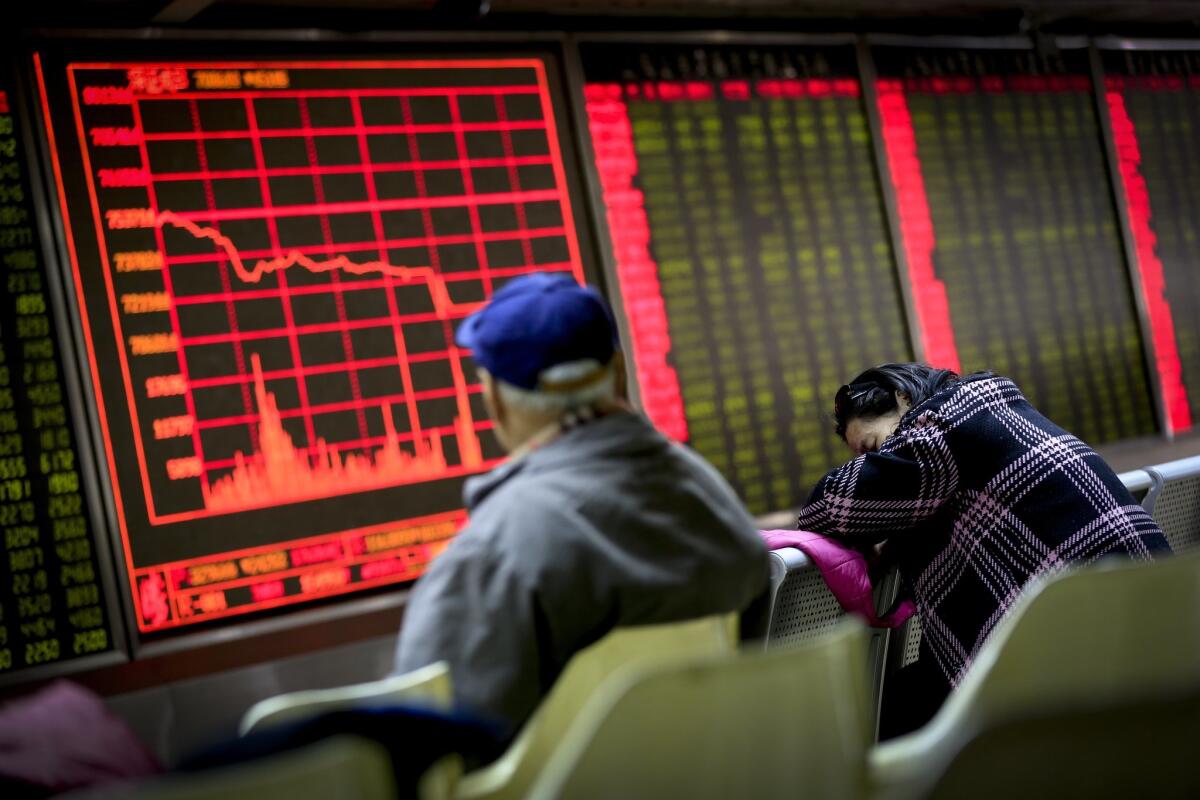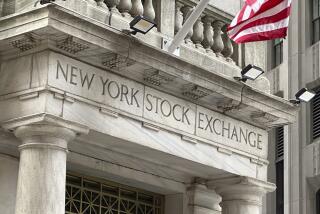China stock market shuts down after shares dive nearly 7%

A woman takes a nap as a man looks at an electronic board displaying stock prices at a brokerage house in Beijing on Jan. 4.
Consider it the Chinese stock market’s first hangover of 2016.
On Monday, the new year’s first day of trading, China’s benchmark Shanghai composite index fell 6.9% to 3,296.66, its lowest level in nearly three months. The Shenzhen composite plunged 8.1%, marking its worst day in nine years. The drop triggered “circuit breakers” for both markets, closing them early to halt the panicked slide.
Monday’s plunge likely gave some investors unwelcome flashbacks to mid-June, when Chinese stocks, riding high on a year of tremendous growth, suddenly began to plummet. By August, despite intense government intervention, China’s major indexes had shed about 40% of their value, wiping $5 trillion from global markets.
Analysts say that investors may have been spooked by official data released over the weekend that showed a fifth straight month of contraction in China’s manufacturing sector, reviving fears that a protracted slowdown in the world’s second-largest economy could be worse than expected.
“Just because we’ve come into a new year doesn’t mean anything,” said Fraser Howie, coauthor of “Red Capitalism: The Fragile Financial Foundation of China’s Extraordinary Rise.” “Maybe people have been hopeful -- they have their new year’s resolutions, we’ve made it to a new year, and we’ll all be fine now. Nope. All the problems we had last year are still here.
“This is a market that had a relatively strong last quarter, that rallied relatively strongly to where it had been [before the summer],” he continued. “I wouldn’t say there’s any real reason for [Monday’s drop] to happen. This is what markets do -- they overreact whenever things start to fall. Selling attracts selling.”
After the summer rout, authorities introduced a new “circuit breaker” mechanism to curb panic selling, and Monday was its first day in action. The mechanism dictates that if the Shanghai Shenzhen CSI 300 Index, an equity index made up of large companies in both cities, falls 5% in one day, trading will halt for 15 minutes; if the index falls 7%, trading will halt for the day.
Shanghai’s trading day on Monday ended at 1:34 p.m. local time.
“The logic behind the circuit breaker is perfectly reasonable -- they’re trying to stop big swings,” Howie said, adding that the mechanism itself won’t solve the Chinese stock market’s woes.
“You have a market that’s still highly warped by government intervention, by government shareholding, by general fear and uncertainty -- and then you have a lot of stuff that’s just grossly overpriced,” he said.
Economists expect China this year to record its lowest growth rate in a quarter of a century, as the country struggles with excess capacity, piles of government debt and weakening demand for key commodities.
ALSO
6.7 earthquake jolts northeastern India, killing 8
Venture capitalist is investing in firms that use computers to improve healthcare
China is building a second aircraft carrier in a bid to project power
More to Read
Sign up for Essential California
The most important California stories and recommendations in your inbox every morning.
You may occasionally receive promotional content from the Los Angeles Times.









